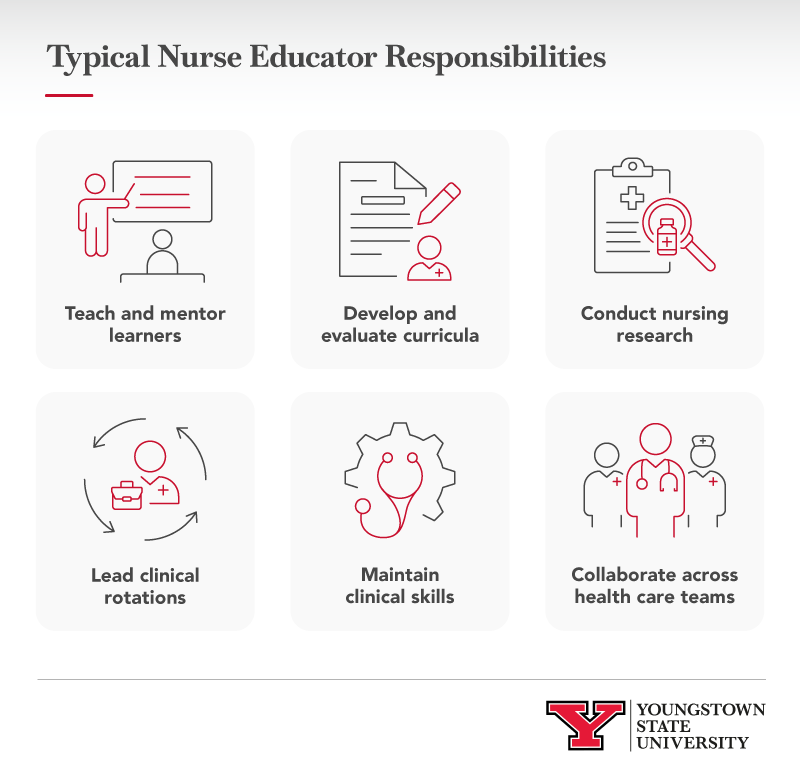
Thousands of nurses are turned away from educational programs each year, not because they lack qualifications, but because schools haven’t been able to find instructors to teach them. The American Association of Colleges of Nursing (AACN) reported that in 2023, over 65,000 qualified applicants were denied entry to nursing programs. Faculty shortages were cited as the main reason for this. On top of that, about 2,000 full-time faculty positions remain vacant across the country, leaving a 7.8% vacancy rate that’s limiting the capacity to train new nurses.
This shortage affects every corner of the nursing profession, both in the classroom and on the hospital ward. Without enough faculty members, the supply of trained nurses falls behind the growing demand for patient care. This puts pressure on the entire healthcare system, negatively affecting patient outcomes.
So, what can you do with a Master of Science in Nursing (MSN) as a nurse educator? These roles go far beyond teaching. They shape clinical practices, develop future leaders and drive improvements across healthcare settings. With the online MSN – Nurse Education program from Youngstown State University (YSU), you can step into a career that blends expertise with purpose and prepare the next generation while advancing your own career.
What Does a Nurse Educator Do?
Behind every competent nurse is an experienced nurse who helped to guide and train them along the way. Nurse educators serve as the link between the clinical expertise of registered nurses and teaching. They combine their background in patient care with the skills needed to prepare others for the realities of the profession.
These professionals work in classrooms, hospitals and other healthcare environments. They use their knowledge to shape both academic programs and the clinical experience. Their influence extends beyond lecture halls and serves as role models, imparting the standards and behaviors expected in nursing practice.

Here are some of the core responsibilities nurse educators take on:
- Teach and mentor learners: Guide students through coursework, labs and clinical placements while serving as a role model for professional conduct
- Develop and evaluate curricula: Create and assess programs that align with accreditation standards and evolving clinical needs
- Conduct nursing research: Explore new evidence-based practices that can improve education and patient care
- Lead clinical rotations: Supervise students during their hands-on training and provide feedback to build confidence and competence
- Maintain clinical skills: Keep any certifications and practical expertise up to date and maintain accreditation in academic and clinical roles
- Collaborate across healthcare teams: Partner with other faculty and clinicians to provide the best possible outcomes for students and patients alike
Nurse Educator Roles: What You Can Do With an MSN in Nurse Education
An MSN focused on education prepares nurses to teach, mentor, and lead across both academic and clinical environments. This advanced degree creates opportunities for experienced nurses to influence how RNs learn and how care is delivered throughout healthcare settings into the future. The sections below outline how this degree connects to a wide range of meaningful opportunities in healthcare.
Academic Nurse Educator
Academic nurse educators work in nursing schools and universities where they prepare students for successful nursing careers. They blend teaching expertise with insight to create engaging learning environments in higher education. These educators shape the programs that help students transition from a Bachelor of Science in Nursing (BSN) into more advanced roles while making sure that quality standards are met. The role typically involves:
- Lead lectures and simulations: Deliver classroom instruction and hands-on learning experiences that prepare learners for clinical practice
- Design and evaluate nursing curricula: Develop courses and assess content to keep education aligned with industry needs
- Mentor students toward licensure: Provide the guidance that supports academic success for nursing students and readiness for the RN licensure process
- Support accreditation compliance: Maintain program quality by meeting accreditation standards and regulatory requirements
Clinical Nurse Educator
A clinical nurse educator works directly with nursing staff in hospitals and other clinical settings and focuses on skill development and onboarding. They make sure that both new and experienced nurses stay current with modern nursing practice and maintain high standards of care through targeted training and support. Responsibilities of the role typically include:
- Mentor of new hires and residents: Guide staff through orientation and early career transitions
- Organize simulations and hands-on skill sessions: Provide practical training to strengthen clinical skills and confidence
- Promote evidence-based practices: Encourage new nurses to adopt proven methods to improve patient outcomes
- Provide continuing education for staff: Offer courses and workshops aimed at supporting professional development and ongoing continuing education
Patient Education Specialist
A patient education specialist is focused on helping individuals and families understand and manage their health. They typically work alongside healthcare professionals in a variety of healthcare settings where they translate complex information into practical guidance for patients. Their role includes:
- Explaining care plans and medications: Clarify treatment steps and drug instructions to patients to improve adherence
- Promoting self-care for chronic conditions: Teach strategies that support long-term patient management and independence for patients
- Improving patient engagement and outcomes: Encourage participation in decisions that affect overall patient care
- Collaborating with healthcare teams: Work with nursing staff and other providers to deliver consistent information and support
Nursing Curriculum Developer
Nursing curriculum developers work behind the scenes to create and nurture the foundation of nursing programs. This role focuses on creating engaging learning experiences and making sure that coursework meets strict education requirements set by organizations like the AACN (American Association of Colleges of Nursing) and NLN (National League for Nursing). Their responsibilities often include:
- Aligning the curriculum with accreditation standards: Design content that satisfies program accreditation and regulatory expectations
- Integration of new technologies and online learning models: Incorporate digital tools and online programs to make learning content more accessible and engaging
- Updating existing materials: Keep the content of courses current and in line with the standards for the future of nursing
- Supporting the adoption of innovative teaching methods: Assist the nursing faculty with resources that strengthen academic and clinical education
Clinical Competency Coordinator
A clinical competency coordinator makes sure that nursing teams maintain the skills required for safe and effective care. They focus more on verifying readiness, addressing any weak spots and promoting ongoing development of existing staff. Key aspects of this role include:
- Assessment of clinical performance: Evaluate staff abilities and identification of any areas that need improvement
- Implementing training: Fill skill gaps by training personnel
- Keeping compliant: Monitor practices to align with clinical standards, institutional policies and regulations
Nursing Professional Development Specialist
A professional development specialist for nursing focuses on lifelong learning within existing nursing teams. They typically work in academic settings and clinical environments to help nurses expand their expertise and pursue new opportunities. Their work typically involves:
- Designing continuing education programs: Create courses that support existing skills and meet evolving practice needs
- Promote certification and career growth: Encourage credentials like CNE (Certified Nurse Educator) and postgraduate nurse education certification to support career advancement
- Organize leadership workshops: Provide training that prepares nurses for supervisory and educational roles
Nursing Education Consultant
Nursing education consultants are brought in by healthcare organizations to offer insights and strengthen training quality. They often have accreditations like Certified Nurse Educators (CNE) and guide program improvements by:
- Analyzing and improving nursing education programs: Evaluate the effectiveness of current programs and recommendations for changes
- Providing guidance on training policies: Ensure that teaching aligns with best practices and standards
- Offering expertise for accreditation: Support institutions that need to meet regulatory and CNE requirements

Advancing as a Nurse Educator
For many nurse educators, completing the MSN is just the beginning of making a broader impact. Those who pursue a doctoral degree, such as a Doctor of Nursing Practice (DNP) or Doctor of Philosophy (PhD), gain the expertise to lead change in higher education, influence policy and guide the very future of nursing education.
For educators who already hold an MSN, earning a nurse educator postgraduate certificate can also open new doors and strengthen existing credentials. With continued education, advanced roles typically include the following responsibilities:
- Leading faculty mentorship and development
- Overseeing curriculum at the institutional level
- Influencing nursing education policies at a national level
- Holding senior positions in academic administration
Skills You’ll Build With YSU’s Online MSN in Nurse Education
Youngstown State University’s online Master of Science in Nursing – Nursing Education program equips you with the competencies needed to excel in any nurse educator role. Accredited by the CCNE, this master’s degree combines advanced coursework with 150 hours of clinical education done in real-world settings.
Graduates leave fully prepared for leadership and ready to meet the education requirements for certification. The key skills you will gain through this nursing degree program include:
- Advanced curriculum design and evaluation: Develop and refine content that meets accreditation standards
- Effective teaching and assessment strategies: Apply proven methods to guide learners and measure outcomes
- Integration of technology in nursing education: Use digital tools to improve instruction in nursing education programs
- Leadership and marketing skills for healthcare education: Prepare for leadership roles that shape academic and clinical environments
- Real-world practicum experience: Apply knowledge in academic and clinical settings through hands-on clinical practice guided by expert faculty
Eligibility and How to Apply
The online MSN programs at YSU welcome all applicants who meet specific criteria for readiness to study. To apply, you will need to:
- Complete the online graduate admissions application: Include the $45 application fee when submitting the form.
- Hold a BSN from an accredited program: Applicants need a minimum undergraduate GPA of 3.0.
- Verify recent RN experience: Submit a Supplemental Employment Verification form that confirms at least one year of clinical RN work experience within the past three years.
- Provide official transcripts from all institutions you have attended: Transcripts must be sent directly from the school electronically or in a sealed envelope.
- Submit proof of a current and unencumbered RN license: Include license expiration and the state where you will complete practicum hours.
- Maintain program compliance: Keep BLS certification, required immunizations, drug screening and background checks current during enrollment.
Your Path to Leading and Teaching in Nursing Starts Here
Becoming a nurse educator means stepping into a role where your expertise shapes the next generation of nurses. It’s a nursing career that blends mentorship with leadership and allows you to share your knowledge while advancing your own goals at the same time.
The shortage of educators makes this the perfect time for nursing professionals to take on teaching roles that influence the future of and strengthen patient care. With YSU’s online Master of Science in Nursing – Nurse Education program, you will gain the skills, clinical experience, and confidence to guide others on their path to success. Start your career path toward mentoring and leadership and apply today.
FAQs for Nurse Educators
Thinking about becoming a nurse educator? These common questions will cover what you need to know about the role, qualifications and why it’s so important to have nursing educators.
What does a nurse educator do?
A nurse educator teaches and supports students and practicing nurses in classrooms and clinical settings. They design lessons, oversee any hands-on training and serve as mentors who prepare learners to deliver safe, high-quality care. Their work is important in making sure that new nurses are ready to meet the tough challenges of modern healthcare.
How do nurse educators contribute to staff development?
In hospitals and other facilities, nurse educators work closely with teams to provide continuing education, offer mentoring and encourage evidence-based practices. When they guide staff through new skills and updated procedures, they also help improve patient outcomes and foster ongoing professional growth.
Does an MSN prepare you to be a nurse educator?
Yes. An MSN in education equips nurses with advanced abilities in curriculum development, clinical instruction and leadership. These competencies prepare graduates to teach, mentor, and manage academic or clinical programs effectively.
How do you become a nurse educator?
To enter this rewarding field:
- Complete an accredited Bachelor of Science in Nursing program.
- Pass the NCLEX-RN exam.
- Obtain state RN licensure.
- Gain at least one year’s experience as a practicing nurse.
- Enroll in a nursing education program such as YSU’s MSN to expand your career opportunities.


